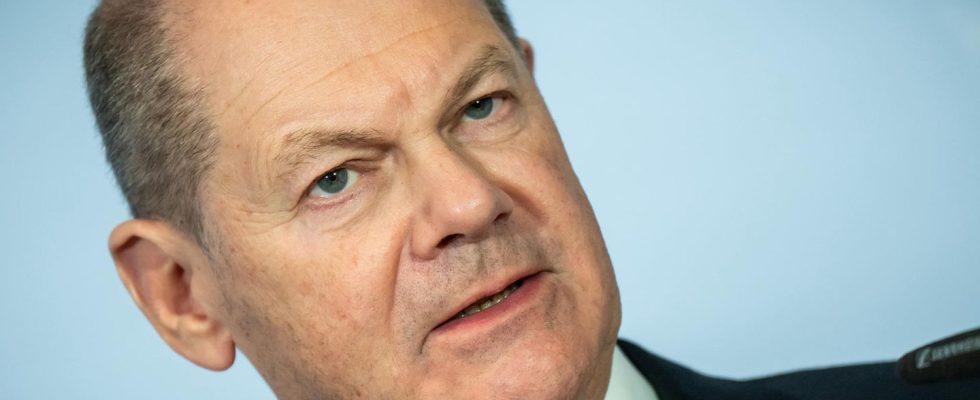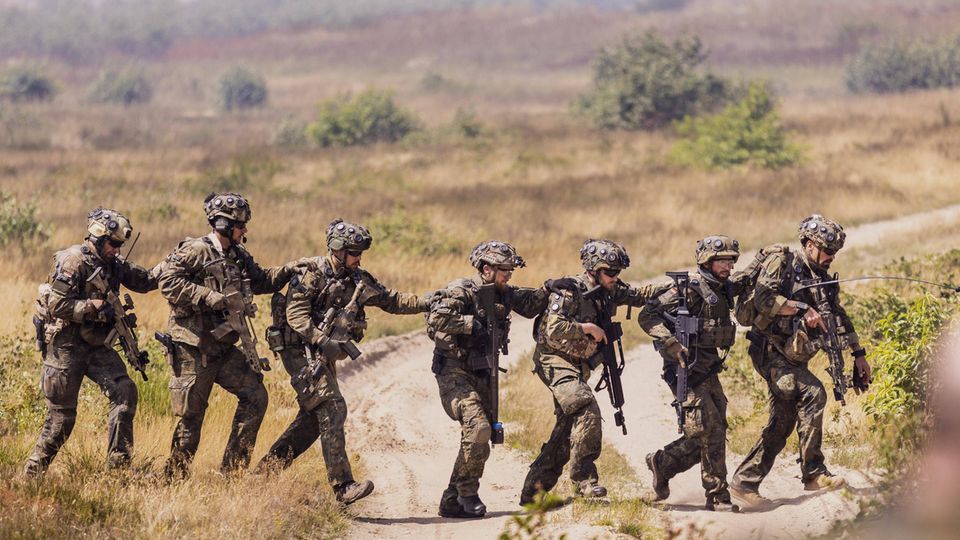Olaf Scholz is often criticized for his deliberative stance in the Ukraine war. The Chancellor could see a report in the New York Times as confirmation of his caution.
Olaf Scholz is not someone who verbally rambles unnecessarily or who tends to use sentences that are simply clear. It may therefore have been forgotten that the Chancellor spelled out early on and with remarkable clarity where his red line was when it came to supporting Ukraine.
“I am doing everything to prevent an escalation that leads to a third world war,” said Scholz shortly after the start of the Russian war of aggression. “There must be no nuclear war.” According to the Chancellor, everything must be done to avoid a direct military confrontation between NATO and Russia.
Two years and a “turning point” later, nothing has changed in this attitude, but the Chancellor is making it clearer again. To this day, Scholz is concerned about a possible escalation that could drag Germany into the war. This was how he justified his rejection of the introduction of a no-fly zone over Ukraine. Today his “no” to the delivery of the German “Taurus” cruise missile is based on this.
His critics complain that Scholz is too timid and too reserved in his approach to the warmonger from the Kremlin. But Scholz believes the majority of Germans are behind him in his deliberative course. Quite a few of them are called to vote in one election or another this year. And so the Chancellor is perhaps acting more than ever as a prudent warning who is protecting the West from nuclear war, at least in the end. The fact that, according to the New York Times, the USA apparently also feared such a scenario could be seen by the Chancellor as confirmation of his caution.
In October 2022, there were apparently increasing signs that Russia could at least consider using nuclear weapons in Ukraine. That sets in current report from the US newspaper vicinity. At that time, American President Joe Biden was informed about intercepted, confidential communications that suggested a certain willingness on the Russian side to engage in nuclear escalation.
In that autumn, the Ukrainian armed forces managed to recapture large areas in the east of the country as part of a counteroffensive. The Russian invaders came under pressure – and perhaps felt cornered. According to the report, it is not documented that Russia had actually considered using nuclear weapons in Ukraine against this background. Nevertheless, the US side was alarmed enough to apparently run through various scenarios. There are also said to have been considerations about what a possible reaction to a Russian use of nuclear weapons could have looked like.
Above all, however, it was important to prevent “Armageddon,” as President Biden described the horror scenario in a speech, through diplomatic channels. Apparently the wires between Washington and Berlin have become hot. According to the New York Times, Chancellor Scholz was informed about the US intelligence information shortly before he left for a planned (and controversial) state visit. Perfect timing?
Olaf Scholz and the stake in Beijing
Scholz flew to Beijing at the beginning of November 2022 – accompanied by skepticism and criticism. The chancellor was the first foreign leader to pay his respects to President XI Jinping after the Communist Party’s People’s Congress. In an unusual step, Xi had himself confirmed for a third term at the party congress and had his domestic political opponents eliminated. Foreign Minister Annalena Baerbock commented on the scheduling with what was generally perceived as sharp criticism, saying that Scholz had chosen the time.
Scholz had previously come under pressure within the government because of the purchase of a Chinese shipping company in the port of Hamburg. Several ministries had rejected Cosco’s investment. A compromise was agreed upon shortly before the Chancellor’s trip. Nevertheless, Scholz was accused of kowtowing to the Chinese rulers.
In the Chancellor’s official press conference with Prime Minister Li Keqiang in Beijing, there was hardly any mention of the war in Ukraine and nuclear weapons. Only gradually did it become clear – including through a communication from the Chinese Foreign Ministry – that Xi had, albeit in very veiled terms, asked Russia not to use nuclear weapons after the conversation with Scholz. The international community must “collectively reject the use and threat of nuclear weapons,” the statement said. We must work together to “prevent a nuclear crisis in Asia and Europe.”
How did Scholz manage that? Hardly anyone had expected Xi Jinping’s confession, but it was initially lost in public perception. The New York Times report now suggests that the chancellor informed the Chinese president about the US findings during their conversation in order to pressure Xi to warn Moscow both publicly and bilaterally against the use of nuclear weapons. It remains unclear whether Xi also issued a corresponding warning in personal contact with Vladimir Putin. Either way: Beijing has driven in a stake.
SPD parliamentary group leader Mützenich: “More important than any individual arms delivery”
Immediately after his return, Scholz himself helped a little to spread the message that he considered a success of his diplomacy: “It is not permitted, it is unacceptable, to use nuclear weapons in this conflict,” he said at an SPD debate convention in Berlin. “We call on Russia to clearly state that it will not do that. That would be a line that must not be crossed.” President Xi Jinping also stated this. “That alone made the whole trip worth it,” he said, dismissing his critics.
A few days later, the G20 summit in Indonesia also adopted a declaration against the use of nuclear weapons, but so general that Russia also agreed to this passage. Scholz then spoke of a “strong signal” in an ARD interview. It was made clear: “This must not happen, this is a red line that must not be crossed,” said Scholz. “And the fact that so many countries have said this together makes the world a little safer.”
Scholz is likely to see his strategy of involving the countries of the so-called global south more closely on geopolitical issues confirmed in order to be able to continue to address global crises in the future. The SPD parliamentary group leader Rolf Mützenich, who helped devise the strategy and represents it aggressively, sees it as an important element in conflict resolution – also with a view to the war in Ukraine.
“I consider the joint commitment with China’s President Xi Jinping that there should be no nuclear escalation to be more important than any individual arms delivery,” Mützenich now told the star. In the Ukraine war, the countries of the global south are also important, so it was right and important that the Chancellor also approached these countries. “The years of black and white thinking in foreign policy are over.”
It cannot be said conclusively whether Russia might actually have considered using nuclear weapons in Ukraine. Government spokesman Steffen Hebestreit did not want to comment further on the New York Times report on Monday. “But perhaps this will give me the opportunity to make it clear once again that we shouldn’t make things so easy for ourselves when it comes to all these balancing questions,” he said at the government press conference. “At least the American administration obviously doesn’t make it that easy for itself.”
Note: And neither is the German Chancellor.


